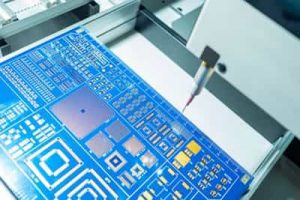Featured News and Information
Made in China, Loved by the World.
JHYPCB is a professional PCB board manufacturer, offering prototype PCB fabrication, small batch circuit board and PCBA manufacturing services.
What Is PCB Immersion Silver Surface Finish?
There are many surface finish processes for printed circuit boards, and immersion silver is one of them. What is PCB Immersion Silver Surface Finish? Immersion silver PCB has many advantages, which we will analyze in this article.
The Advantages and Disadvantages of Surface Mount Technology (SMT)
SMT, or Surface Mount Technology, is one of the printed circuit board assembly processes. Surface mount technology has a more comprehensive application, lower cost, and higher efficiency than through-hole technology. This article will analyze the advantages and disadvantages of SMT.
Prototipo de PCB: ¿Qué es? ¿Para qué sirve?
Los PCB (Placa de circuito impreso) son la columna vertebral de la electrónica y un PCB defectuoso significa una pérdida de tiempo y dinero.
How To Reduce The PCB Manufacturing Cost?
Price is often an essential reference when we buy a product or a service. If you’re into designing and manufacturing printed circuit boards and want to learn how to reduce PCB manufacturing costs, you’ve come to the right place.
How to clean the PCB assembled boards? [Solved]
PCBAs need to be cleaned because the boards are more or less inevitably contaminated during the assembly process. Whether you assemble a printed circuit board yourself or a circuit board assembled at a PCB assembly plant, it needs to be cleaned after assembly.
Materials Used in Surface Mount Technology
Surface mount technology is one of the PCB assembly technologies, which is the process of mounting electronic components on the surface of a printed circuit board. Surface mount technology requires solder paste, flux, and other materials.
What Is Rogers Material PCB?
There is no doubting that fact that Rogers is one company that has managed to stand out amongst others in manufacturing laminate materials that are used in today’s circuit board. Printed circuit boards fabricated from Rogers materials offers strong moisture absorption and better thermal management.
What is Hot Air Solder Leveling (HASL)
Hot Air Solder Leveling, abbreviated as HASL, is one of the surface finish processes of printed circuit boards. Hot Air Solder Leveling is also the most popular type of PCB surface finish.
Selective Wave Soldering Guidelines
The two major process technologies in PCB assembly include surface mount technology and through-hole technology, which will use reflow soldering technology and wave soldering technology, respectively. With the development of assembly technology and the need for practical applications, selective wave soldering is also increasingly popular.
5 kinds of circuit board assembly welding production process
There are many welding methods in the PCB assembly process. This article will introduce 5 welding processes that may be encountered in the PCB assembly process in detail.
PCB Stackup Design Guidelines and Considerations
As a professional PCB manufacturer, we have summarized the following PCB stacking design guidelines and precautions in practical applications, hoping to be helpful to most PCB designers.
SMT PCB Assembly Manufacturing Process Introduces
SMT surface mount technology is one of the manufacturing processes in the PCB assembly industry. SMT is also the most automated technology in the modern electronics assembly industry. This article will elaborate on the process flow of surface mount technology.
What Is PCB Immersion Gold ENIG Surface Finish?
The popularity of immersion gold surface finish has grown over the years. Today, it is the trendiest idea amongst others in the industry.
What Is PCB OSP Surface Finish?
OSP refers to Organic Solderability Preservative. It is the leading PCB surface finishing coating option used by the PCB industry for protecting Copper surfaces and its features that are exposed from oxidation before the PCB is populated.
The Influence Of Dust On The Quality Of SMT Production Line
Surface mount technology places high demands on the environment of the production workshop. As a PCB assembly manufacturer, controlling the environmental pollution of the SMT production line is also critical to product quality. This article will analyze the impact of dust on the quality of SMT production lines.
The Two Typical SMT Reflow Soldering Temperature Curve Modes
The most critical process in SMT technology is the reflow soldering process. The quality control of the reflow soldering process determines the quality of the terminals produced by SMT because defects caused by the design of surface mount components and printed circuit boards, solder paste printing, and component placement will eventually be concentrated in the reflow soldering process.
What Is Flexible PCB Coverlay (FPC Cover Layer)?
A flexible PCB coverlay provides the same functionality as a solder mask used on rigid PCBs. However, a flexible PCB coverlay offers more durability and flexibility which are very important in the application of flexible printed circuits compared to a solder mask with limited flexibility.
The Manufacturing Process Of Double-sided Flexible PCB Coverlay
One of the unique processes of the flexible printed board manufacturing process is the processing of the cover layer. The processing methods of the cover layer can be divided into three categories: cover film, screen printing, and photo coated layer.
Why Should PCB Reliability Be Taken Seriously?
High-reliability PCB can play a stable carrier role and realize the long-term and stable operation of PCBA, thereby ensuring the safety, stability, and service life of end products, and enterprises can enhance competitiveness, improve reputation, expand market share, and improve economic benefits.
What Are The Advantages And Applications Of Rigid-Flex PCBs?
Rigid-flex PCBs seamlessly integrate the strengths of rigid and flexible circuits, delivering unparalleled advantages over conventional PCB designs. With increased reliability, higher component density, and streamlined assembly, rigid-flex PCBs enable compact, lightweight solutions ideal for industries like aerospace, medical, automotive, and consumer electronics. Explore the key benefits and diverse applications of this cutting-edge PCB technology.
